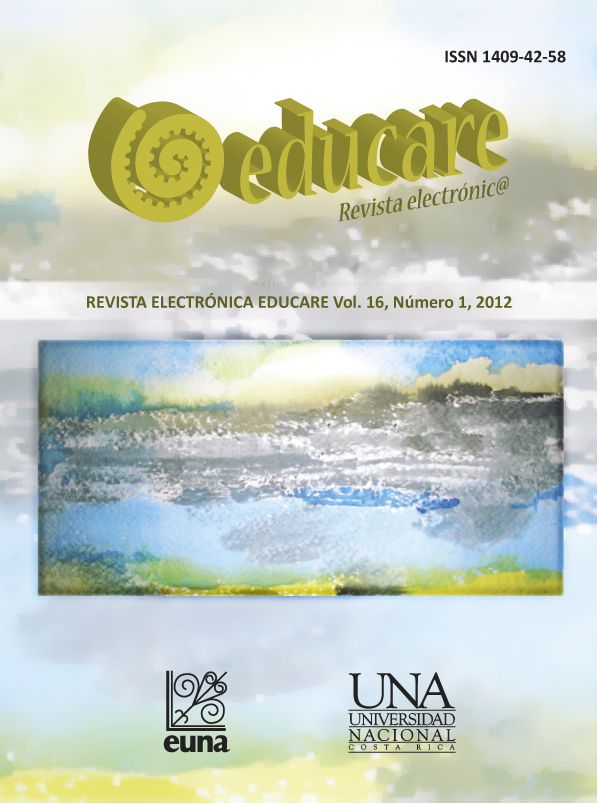Educating with Alternative Media
DOI:
https://doi.org/10.15359/ree.16-1.5Keywords:
Education, pedagogical mediation, cinematography, alternative mediaAbstract
This paper emerges from my interest in exploring ways to transform the daily classroom educational activity into a more pleasant and interesting experience. In this regard, I call attention to the possibilities of cinematography and other audiovisual media as pedagogical means, and the advisability for educators to use them as enhancing alternatives to their professional performance.References
Assmann, H. (2002). Placer y ternura en la educación. Hacia una sociedad aprendiente. Madrid:
Narcea. Recuperado de http://es.scribd.com/doc/52694668/Hugo-Assman-Placer-y-ternura
Fernánez, V. (Domingo 14 de octubre de 2007). Los reyes de la taquilla. La Nación (Suplemento
Viva), p. 5.
Gore, A. (Productor), Guggenheim, D (Director). (2006). Una verdad incómoda [Documental].
Estados Unidos: Paramount Pictures.
Gutiérrez, F. y Prieto, D. (2004). La mediación pedagógica. Apuntes para una educación a
distancia alternativa (10ª ed.). Falta la ciudad: La Copia Fiel.
Martí, J. M. (25 de junio de 2006). El profeta del cambio climático. El país. Recuperado de http://
elpais.com/diario/2006/06/25/eps/1151216807_850215.html
Radmanesh, M. (2006). Cracking The Code of Our Physical Universe: The Key to a World of
Enlightenment and Enrichment. Estados Unidos de América: AuthorHouse.
Downloads
Published
How to Cite
Issue
Section
License
1. In case the submitted paper is accepted for publication, the author(s) FREELY, COSTLESS, EXCLUSIVELY AND FOR AN INDEFINITE TERM transfer copyrights and patrimonial rights to Universidad Nacional (UNA, Costa Rica). For more details check the Originality Statement and Copyright Transfer Agreement
2. REUTILIZATION RIGHTS: UNA authorizes authors to use, for any purpose (among them selfarchiving or autoarchiving) and to publish in the Internet in any electronic site, the paper´'s final version, both approved and published (post print), as long as it is done with a non commercial purpose, does not generate derivates without previous consentment and recognizes both publisher's name and authorship.
3. The submission and possible publication of the paper in the Educare Electronic Journal is ruled by the Journal’s editorial policies, the institutional rules of Universidad Nacional and the laws of the Republic of Costa Rica. Additionally, any possible difference of opinion or future dispute shall be settled in accordance with the mechanisms of Alternative Dispute Resolution and the Costa Rican Jurisdiction.
4. In all cases, it is understood that the opinions issued are those of the authors and do not necessarily reflect the position and opinion of Educare, CIDE or Universidad Nacional, Costa Rica. It is also understood that, in the exercise of academic freedom, the authors have carried out a rogorous scientific-academic process of research, reflection and argumentation thar lays within the thematic scope of interest of the Journal.
5. The papers published by Educare Electronic Journal use a Creative Commons License:














 The articles published by Educare Electronic Journal can be shared with a Creative Commons License:
The articles published by Educare Electronic Journal can be shared with a Creative Commons License: 



